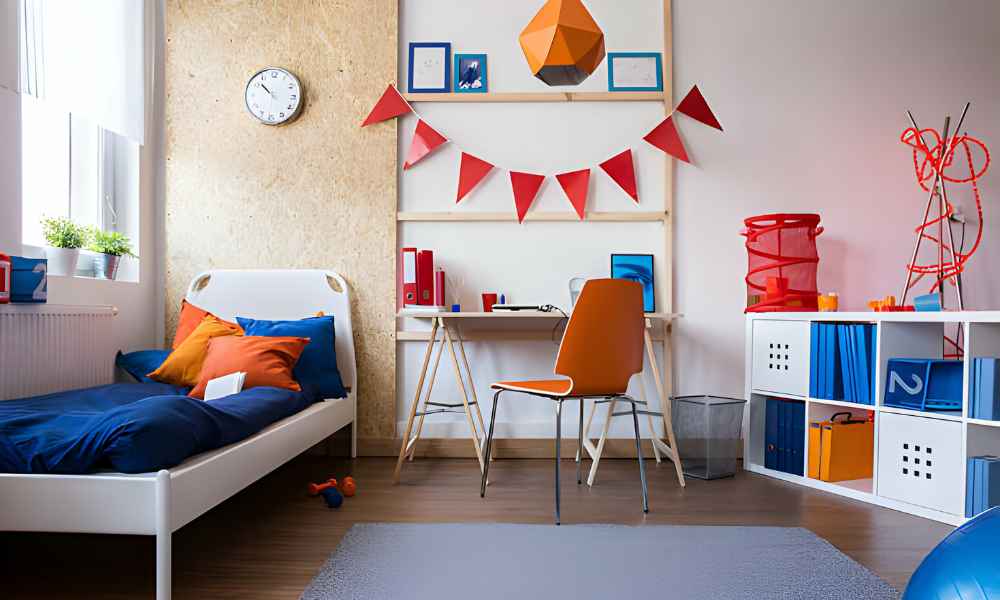Finding the ideal location to place a desk in a bedroom is crucial for creating a productive and comfortable workspace. Whether you’re a student, a remote worker, or someone who enjoys pursuing hobbies at a desk, strategic placement can make a significant difference in your daily routine. By considering factors like space utilization, access to natural light, views, and electrical outlets, you can optimize your desk setup for maximum efficiency and convenience.
Utilizing Space Effectively
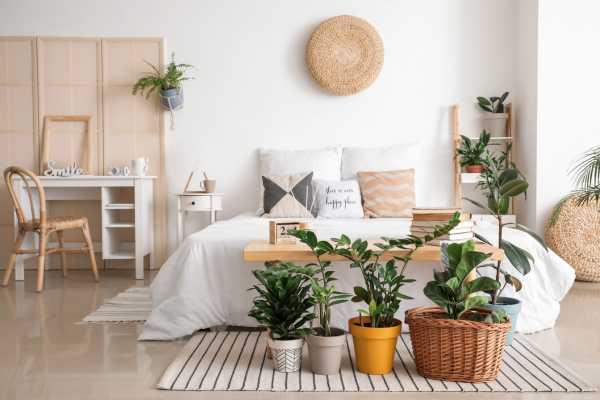
It’s essential to consider space utilization. Opting for a corner or wall adjacent to a window can help maximize floor space while providing a dedicated area for work or study. Additionally, choosing it with built-in storage solutions, such as drawers or shelves, can further optimize space by reducing clutter and keeping essential items within reach. By prioritizing functionality and organization, you can create a workspace that promotes productivity and creativity.
Natural Light and Views
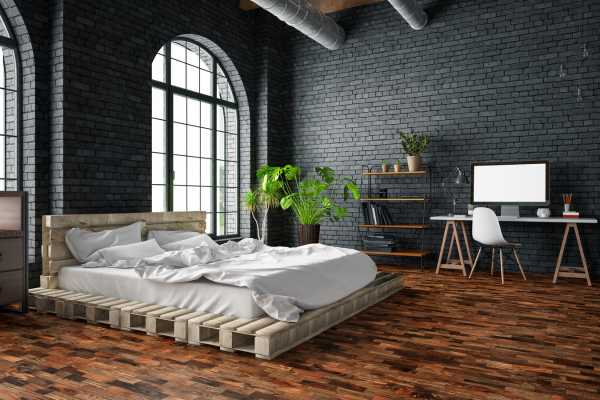
The placement of a desk with natural light and views can greatly impact your mood and productivity. Positioning the desk near a window allows for ample natural light, which can help reduce eye strain and increase energy levels. Furthermore, having a view of the outdoors can offer moments of relaxation and inspiration during breaks from work. However, it’s essential to consider potential glare and distractions when positioning it near windows, and using window treatments like blinds or curtains can help mitigate these issues while still allowing for natural light and views.
Electrical Outlets and Accessibility
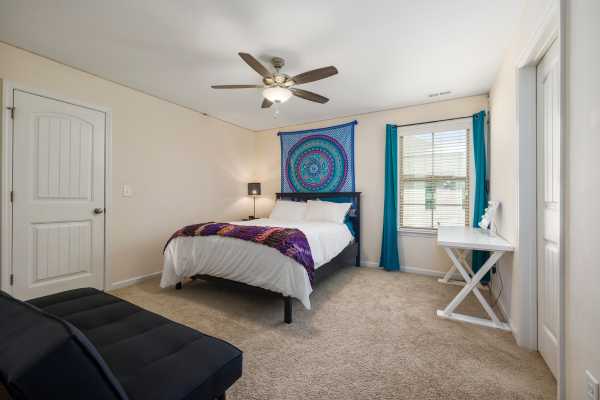
Another crucial aspect to consider when deciding where to place it in a bedroom is accessibility to electrical outlets. Ensuring easy access to outlets is essential for powering electronic devices such as laptops, printers, and desk lamps. It’s advisable to position near existing outlets or invest in extension cords or surge protectors to accommodate multiple devices. Additionally, maintaining a clear pathway to the outlets can prevent tripping hazards and make it easier to plug and unplug devices as needed. By prioritizing accessibility to electrical outlets, you can streamline your workflow and minimize disruptions while working or studying at your desk.
Ergonomics and Comfort

Choosing the right location for a desk in a bedroom involves considering ergonomics and comfort. Placing the desk at an appropriate height and ensuring proper seating can help prevent discomfort and strain during long hours of work or study. Additionally, positioning in a well-lit area with adequate ventilation can contribute to a more comfortable and conducive workspace. By prioritizing ergonomics, you can create a setup that promotes good posture and reduces the risk of musculoskeletal issues, ultimately enhancing productivity and well-being.
Minimizing Distractions
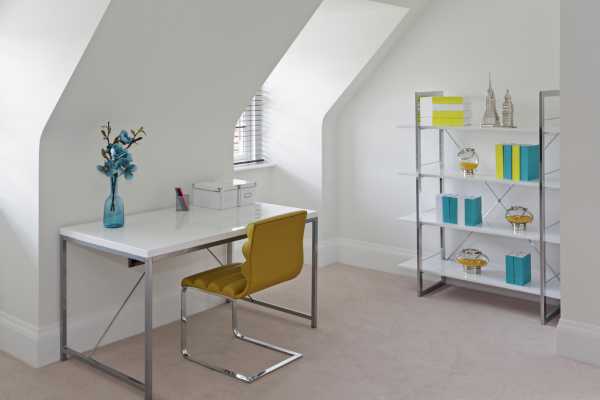
One key consideration when deciding where to place it in a bedroom is minimizing distractions. Opting for a quiet corner away from high-traffic areas can help foster focus and concentration. Additionally, positioning the desk facing away from sources of noise or movement, such as doorways or TVs, can further reduce distractions and enhance productivity. Creating a dedicated workspace free from clutter and unnecessary items can also contribute to a more focused and efficient work environment, allowing you to stay on task and accomplish your goals with ease.
Personal Preferences and Workflow
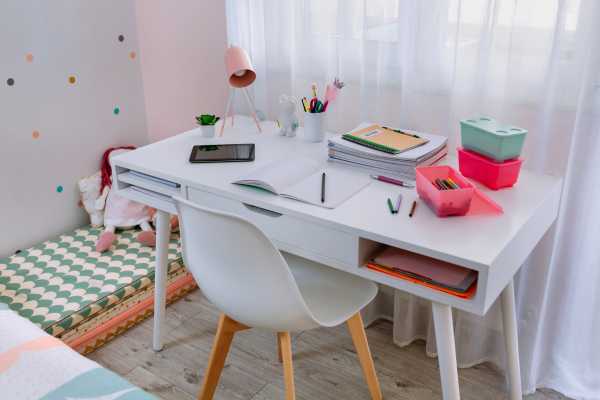
Every individual has unique preferences and workflow requirements when it comes to workspace setup. Some may prefer a secluded corner for quiet contemplation, while others may thrive in a more open and collaborative environment. Considering your personal preferences and workflow patterns can help guide the placement of your desk in the bedroom. Whether you prefer natural light streaming in from a window or a cozy nook tucked away from sight, tailoring the workspace to suit your needs can enhance comfort and productivity. By creating a space that aligns with your preferences and workflow, you can optimize your efficiency and enjoyment while working or studying at your desk.
Design Aesthetics

In addition to functionality and comfort, design aesthetics play a significant role in determining where to place a desk in a bedroom. The desk should complement the overall décor and style of the room, creating a cohesive and visually pleasing environment. Whether you prefer a minimalist, Scandinavian-inspired design or a more traditional, vintage look, selecting a desk that harmonizes with your aesthetic preferences can enhance the ambiance of the space. Consider factors such as color, material, and form when choosing and arranging it within the room. By incorporating design elements that reflect your style, you can create a workspace that inspires creativity and reflects your unique personality.
Privacy and Concentration
Deliberating where to position a desk in a bedroom, privacy, and concentration are paramount considerations. Placing in a secluded area or using room dividers can help create a private workspace conducive to focus and productivity. Additionally, positioning the desk away from noise sources and high-traffic areas can further enhance concentration. By prioritizing privacy, you can create a tranquil environment where you can work or study without distractions, fostering a sense of serenity and allowing for deep concentration.
Future Flexibility and Adaptability

Another crucial aspect to consider when deciding where to place a desk in a bedroom is future flexibility and adaptability. Opting for a location that allows for easy reconfiguration and expansion of the workspace can accommodate changing needs and preferences over time. Choosing a modular desk or incorporating movable furniture can facilitate flexibility, enabling you to adapt the layout to suit evolving work or study requirements. By planning for future changes and ensuring adaptability, you can future-proof your workspace and maximize its longevity and utility.
Lighting Considerations
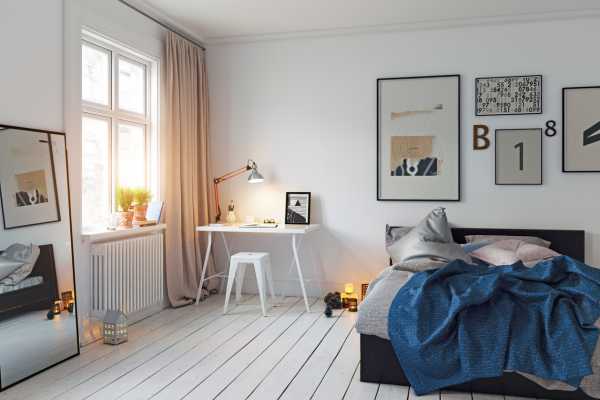
Lighting plays a significant role in determining the ideal location for a desk in a bedroom. Positioning near a window or incorporating task lighting can provide adequate illumination for work or study tasks. Natural light not only enhances visibility but also boosts mood and productivity. However, it’s essential to consider potential glare and shadows when positioning the desk near windows and to adjust window treatments accordingly. Additionally, incorporating adjustable lighting solutions can allow for customization based on personal preference and task requirements, ensuring optimal visibility and comfort throughout the day and evening.
Temperature and Ventilation
Temperature and ventilation are often overlooked yet critical factors when considering where to place a desk in a bedroom. Positioning in an area with proper airflow and temperature regulation can contribute to comfort and well-being during extended work or study sessions. Avoiding locations near heating or cooling vents can prevent discomfort caused by uneven temperatures or drafts. Additionally, incorporating features such as ceiling fans or portable air purifiers can enhance air circulation and quality, creating a more comfortable and conducive workspace environment. By prioritizing temperature and ventilation considerations, you can ensure a pleasant and productive workspace experience year-round.
Cable Management and Organization
Effective cable management and organization are essential factors to consider when determining where to place a desk in a bedroom. Opting for a location near power outlets can simplify cable management and minimize the need for long, unsightly cords trailing across the room. Incorporating cable management solutions such as cable clips, cable sleeves, or under-desk cable trays can help keep cords organized and out of sight, reducing clutter and trip hazards. Additionally, choosing a desk with built-in cable management features or incorporating accessories designed to conceal cables can further streamline the workspace and create a neat environment conducive to productivity.
Compatibility with Technology
Another critical consideration when deciding where to place it in a bedroom is compatibility with technology. Positioning the near existing technology infrastructure, such as Wi-Fi routers or Ethernet ports, can facilitate seamless connectivity and reduce the need for additional wiring or adapters. Additionally, ensuring ample space for essential technology peripherals such as monitors, keyboards, and printers can enhance workflow efficiency and ergonomic comfort. By prioritizing compatibility with technology, you can create a workspace that seamlessly integrates with your digital tools and enhances your overall productivity and connectivity.
How can I determine the best placement for a desk in my bedroom?
- To determine the best placement for a desk in your bedroom, consider factors such as:
- Natural light: Position the desk near a window to take advantage of natural light, which can enhance productivity and mood.
- Electrical outlets: Ensure easy access to electrical outlets for powering lamps, chargers, and electronic devices by choosing a location near existing outlets.
- Traffic flow: Avoid placing the desk in high-traffic areas of the bedroom to minimize distractions and maintain a productive work environment.
- Aesthetic: Consider the overall aesthetic and design of the bedroom, and choose a placement that complements the existing decor and enhances the ambiance of the room.
Conclusion
Determining where to place a desk in a bedroom involves careful consideration of various factors to optimize functionality, comfort, and productivity. By prioritizing aspects such as cable management and organization, compatibility with technology, privacy, and concentration, and lighting considerations, you can create a workspace that meets your unique needs and preferences. Whether you’re studying, working remotely, or pursuing hobbies, strategic placement of your desk can enhance efficiency, reduce distractions, and contribute to a more enjoyable and productive workspace experience. By incorporating these considerations into your decision-making process, you can design a workspace that supports your goals and promotes well-being in your bedroom environment.
